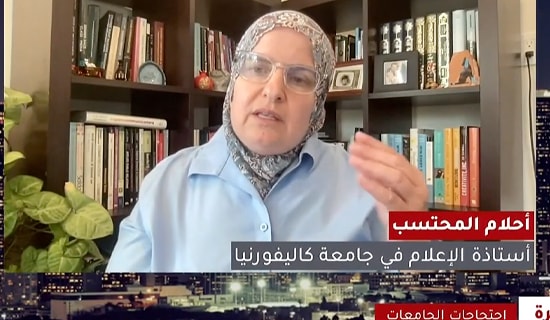
Following are excerpts from an Egyptian TV report on common nuptial deflowering in Egypt, which aired on Channel one on October 8, 2009:
Obstetrics expert Dr. Rima Khafsh: One of the things that shocked me most was a girl, living in a slum, whose cousin told her that on the day of their wedding, he would deflower her at the bus station, as her father had insisted.
Interviewer: At the bus station?!
Dr. Rima Khafsh: Yes, in the street.
[...]
In other words – her honor is violated in public.
Dr. Rima Khafsh: They spread a sheet on the ground, and all the women encircled the girl, and her father said: He will take her honor in the street. If it turns out that she was a virgin, he will marry her, and if she is not a virgin, she will be killed then and there.
Interviewer: At the bus station?
Dr. Rima Khafsh: Yes, the bus station at Ein Siwa.
Interviewer: It is horrific that a father could insist that his daughter’s honor be violated in public, after raising her all her life to believe that her body is sacred.
Dr. Rima Khafsh: They did not actually kill her, but they killed her in spirit.
[...]
It is not rare for women to use an expression that accurately describes their feelings about sex with their husbands. They say: “After my husband uses me, I feel tired.”
Interviewer: Dear God.
Dr. Rima Khafsh: They feel their husbands use them and are not their life partners.
[...]
Egyptian woman: It happened to me. It was done in the “common” way. I didn’t want it to be this way, but it happened.
It is a moment of joy, but at the same time, it is not. It is a moment of joy because I am entering a new world with someone I love, and because I am a bride, entering a beautiful world, yet it becomes a painful moment. Losing your virginity this way is unpleasant.
They put you in a terrible situation.
All of a sudden, your dress is lifted, the veil comes up within seconds, and there is stress, and everything... Even though I am embarrassed and shy of him, I find myself completely naked in front of him.
Of course, it is difficult and unpleasant.
I see him at that moment, and my aunts and all my family are there, participating in this moment, even though I was still a virgin, I was embarrassed even if he touched my hand.
All of a sudden, I found myself in front of my family, naked, and so on.
I was thinking: Okay, I am afraid of this, but when I do it with him later, I will not be afraid. It will be with love.
I was afraid because I didn’t know what was about to happen. I didn’t know what to think. I just saw this white piece of cloth. I didn’t what they would do with all this.
Interviewer: We have Nadia with us. Nadia, you experienced “common” deflowering. Do you think this was a just thing to do from the social prospective, or was it like a castration of your personality?
Nadia: It was like rape.
The family and friends held a wedding ceremony, as is customary. When we left, I thought that my husband and I would be going home, and shutting the door behind us. Even if this had happened – if we had gone home and shut the door – I wouldn’t have had the courage to be naked in front of him. I was still shy.
Interviewer: This is a whole new life for you.
Nadia: They gave me no chance to get over my shyness, to talk to him. Neither did he. I saw my father standing outside. My aunts and my mother entered, looking like they were going to kill me, and he was helping them. My husband, whom I loved, was helping them.
I felt that he...
Interviewer: What did he say to you?
Nadia: He took off my clothes. He didn’t give me a chance to do it myself. He took off my veil, and...
Interviewer: My God, like that all at once?
Nadia: It was as if he couldn’t wait any longer.
Interviewer: This is an assault.
Nadia: Yes, it was an assault on me. That’s why I said this was rape. His attack was bloodcurdling.
When it was over, the women began ululating and whatnot.
Interviewer: Why ululating?
Nadia: They took the piece of bloodstained cloth outside and began ululating.
Interviewer: What did you feel towards him and towards your family at that moment?
Nadia: I was very angry at them because they did not trust me. Doing such a thing means they do not trust their daughter. They did not protect me. This is what made me so upset.
Interviewer: And after that?
Nadia: After what happened, I felt shivers of fear throughout my body. I felt that I hated him, that I didn’t want him at all. For four days, I was bleeding. I was also afraid. After that, when he desired me as his wife, I would feel fear.
Interviewer: You were closed...
Nadia: I didn’t want him.
Interviewer: Did you manage to overcome these feelings with time?
Nadia: A little bit, with time. But whenever I see a girl getting married, I say to myself: Poor thing, I hope they don’t do the same to her.
Interviewer: Couldn’t you say no?
Nadia: I kept expecting someone to say no – my husband.
[...]












